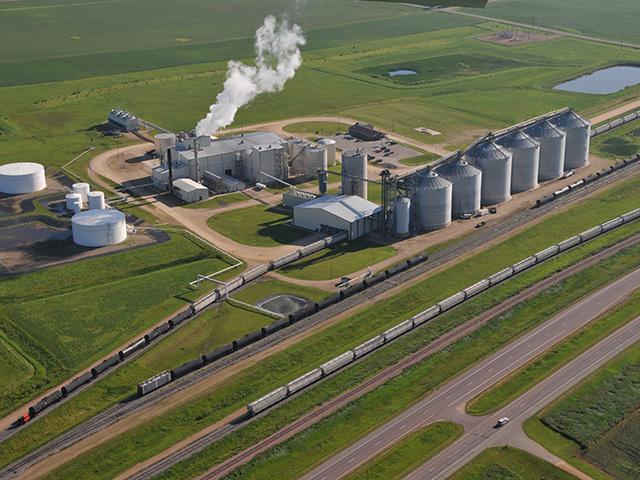Ethanol Opposes Volume Cut
Ethanol, Oil Interests Try to Influence OMB on Renewable Fuel Standard
LINCOLN, Neb. (DTN) -- As the ethanol industry awaits the release of proposed Renewable Fuel Standard volumes from EPA, a handful of industry representatives on Friday asked the Office of Management and Budget to not retroactively reset the 2020 volumes.
The Biden administration has been considering a number of RFS volumes scenarios in light of the COVID-19 economic shutdown last year that resulted in low transportation fuel demand. That lost demand led to ethanol plants either cutting production or shutting down operations.
In a conference call on Sept. 10, Renewable Fuels Association President and CEO Geoff Cooper told the OMB the 2020 volumes should not be reduced retroactively.
In an RFA document posted to the OMB website, the group said it was concerned about recent media reports suggesting the Biden administration was ready to reduce 2020 volumes.
"The Renewable Fuels Association strongly encourages the White House and U.S. Environmental Protection Agency to reject recent requests from petroleum refiners and oil-state senators to retroactively lower renewable volume obligations for 2020," the group said in the document.
"We are gravely concerned by recent media reports suggesting that EPA may seek to pacify refiners by attempting to retroactively reduce the 2020 RVO. It is our sincere hope that these news reports are mistaken. Retrospective revisions to the 2020 RVO would further destabilize the renewable fuels industry and farm sector, both of which are still struggling to recover from COVID-related market disruptions."
RFA said such an action would "mark an unprecedented and inexplicable departure from EPA's statutory authorities and established practices."
The EPA issued the final 2020 RVO on Dec. 19, 2019. RFA said as a result, renewable fuel producers, many petroleum refiners and importers, farmers, fuel retailers and others made investments and took other actions to comply.
"Revising the 2020 RVO two years later would unfairly penalize those market participants who invested and acted in good faith to comply with the original RVOs, while only benefitting those oil refiners who slowed or halted purchases of renewable fuel credits this year as they lobbied the Biden administration for regulatory relief," the RFA said in its document.
Chris Bliley, senior vice president of regulatory affairs for Growth Energy, is scheduled to meet with the OMB on Tuesday.
P[L1] D[0x0] M[300x250] OOP[F] ADUNIT[] T[]
Refiners and members of Congress from oil-producing states have called on EPA to make an adjustment to 2020 volumes, claiming the economic shutdown caused a reduction in gasoline and diesel consumption.
"However, the annual RVO already includes a self-correcting mechanism that causes actual renewable fuel volume requirements to adjust lower with reduced gasoline and diesel consumption," the RFA said.
"This automatic adjustment resulted in an actual total renewable fuel volume requirement of just 17.99 billion gallons in 2020, roughly 10.5% lower than the volume of 20.09 billion gallons published in the final rule. Even if EPA doesn't grant any of the prospectively reallocated small-refinery exemptions that were included in the 2020 RVO, the total renewable fuel volume requirement would be just 18.76 billion gallons due to COVID-induced automatic reductions."
RFA said such a retroactive exemption to the 2020 volumes would be "unprecedented and wholly inconsistent with the agency's past practices and statements."
The RFA points to a statement made by EPA in regard to the 2010 RFS regulations.
EPA stated it believed the RFS is to require the issuance of a single annual standard in November that applies to the following calendar year so as to provide notice and certainty to obligated parties. The agency said, "periodic revisions would be inconsistent with the statutory text and would introduce an undesirable level of uncertainty for obligated parties."
In the pre-amble to the 2012 volumes proposal the agency wrote "while the statute requires EPA to publish the standards for the following year by Nov. 30 of the preceding year, there is no provision for changing the percentage standards once they are set."
The RFA said there was no "market-based rationale or legal basis" for retroactively lowering the 2020 volumes finalized two years ago.
"Doing so now would represent a win for oil refiners at the expense of low-carbon biofuel producers, farmers, and consumers looking for cleaner fuel options," the RFA said. "Requests from oil refiners to retroactively revise the 2020 RVO should be rejected."
Last week, representatives from oil companies including the American Petroleum Institute met with the OMB to discuss the RFS proposal.
The API asked for a reduction in RFS volumes for 2021 and 2022, to below the percentage standards for 2020.
In a document posted to the OMB website in reference to the Sept. 9 meeting, the API said it was "not feasible to consume 15 billion gallons of ethanol in the domestic gasoline market."
API said it was concerned that raising volumes for 2021 and 2022 would exceed the blend wall -- where total ethanol production exceeds the volume that can be blended with gasoline.
Read more on DTN:
"American Petroleum Institute Pushes EPA to Cut Renewable Fuel Standard Volumes," https://www.dtnpf.com/…
"EPA Sends RFS Volumes Proposal to OMB,"
"Biden Admin to Delay Late RFS Proposals,"
Todd Neeley can be reached at todd.neeley@dtn.com
Follow him on Twitter @DTNeeley
(c) Copyright 2021 DTN, LLC. All rights reserved.




